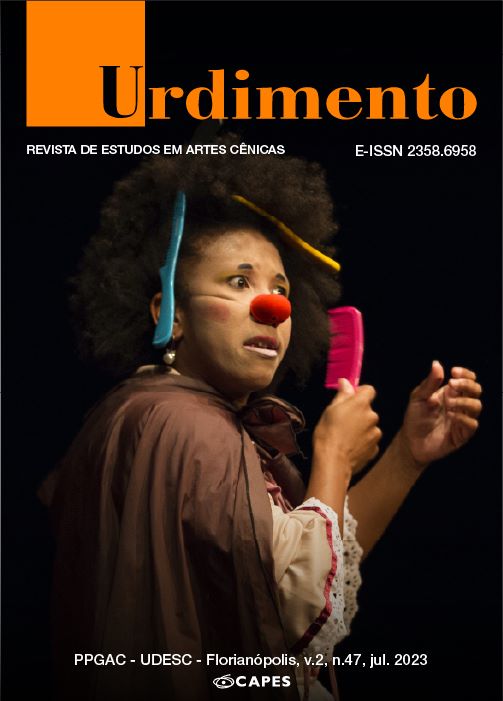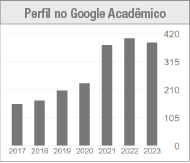A criança como modelo na pedagogia do Clown: em Jacques Copeau, Jacques Lecoq e Philippe Gaulier
DOI:
https://doi.org/10.5965/1414573102472023e0104Palavras-chave:
Criança, Clown, Pedagogia teatral, Teatro francês, AtuaçãoResumo
O artigo é oriundo de minha pesquisa de doutorado sobre a criança como modelo na pedagogia teatral. Evidenciam-se relações tácitas entre a criança e o clown no pensamento de Jacques Copeau e a maneira pela qual a criança se torna um modelo para a aprendizagem da linguagem clownesca nas pedagogias de Jacques Lecoq e de Philippe Gaulier. Objetiva-se a problematização de lugares comuns sobre a relação criança-clowna partir de um diálogo com diferentes disciplinas (antropologia, psicanálise, psicologia, performance studies), em busca de uma compreensão expandida de noções como inocência, autenticidade, singularidade e criatividade na formação do clown dentro da tradição teatral francesa de Copeau-Lecoq-Gaulier.
Downloads
Referências
AUSLANDER, Philip. From Acting to Performance: Essays in Modernism and Postmodernism. London and New York: Routledge, 1997.
BRUM, Daiani Cezimbra Severo Rossini. Mulheres palhaças e a política uterina de expansão: entrevista com Karla Concá. Urdimento: Revista de Estudos em Artes Cênicas, Florianópolis, v. 3, n. 33, p. 455-468, nov. 2018. Disponível em: https://doi.org/10.5965/1414573103332018455. Acesso em: 26 jul. 2023.
COPEAU, Jacques. Anthologie inachevée à l’usage des jeunes générations. Paris: Gallimard, 2012.
COPEAU, Jacques. Réflexions sur un comédien. Copeau l’éveilleur, textes réunis par Patrice Pavis et Jean-Marie Thomasseau, Bouffonneries. n. 34, p. 25‑29, 1995.
COPEAU, Jacques. Registres VI, L’École du Vieux-Colombier. Paris: Gallimard, 1999 (Registres / Jacques Copeau., 6; Pratique du théâtre).
FERRACINI, Renato. Café com Queijo. Corpos em Criação. São Paulo: Hucitec, 2006.
GAULIER, Philippe. “A clown is innocent”: Philippe Gaulier tips a bucket of water over creepy craze. The Guardian, sect. Stage, 4 nov. 2016a. Disponível em: http://www.theguardian.com/stage/2016/nov/04/creepy-clown-craze-philippe-gaulier. Acesso em: 29 set. 2020.
GAULIER, Philippe. O Atormentador. Minhas Ideias Sobre Teatro. São Paulo, Brasil.: Sesc, 2016b.
JOUSSE, Marcel. "Le premier éveil du mimisme" , Ière Conférence - 4 novembre 1935, 4ème année, 1935-1936. École d'Anthropologie Jousse In: Les cours de Marcel Jousse. [S. l.]: Association Marcel Jousse, [s. d.]. Disponível em: https://www.marceljousse.com/les-cours-de-marcel-jousse-disponibles-en-telechargement/. Acesso em: 10 out. 2019.
JOUSSE, Marcel. « L'anthropologie et le jeu humain », curso de 8 de novembro de 1937 na École d'Anthropologie Jousse In: Les cours de Marcel Jousse. [S. l.]: Association Marcel Jousse, [s. d.]. Disponível em: https://www.marceljousse.com/les-cours-de-marcel-jousse-disponibles-en-telechargement/. Acesso em: 10 out. 2019.
LECOQ, Jacques. O corpo poético: uma pedagogia da criação teatral. Trad.: Marcelo Gomes. São Paulo: SENAC São Paulo; SESC SP, 2010.
LECOQ, Jacques. Les gestes de la vie. In: Le théâtre du geste: mimes et acteurs. Collection Bordas spectacles. Paris: Bordas, 1987a. p. 18‑30.
LECOQ, Jacques; PERRET, Jean. L’explosion du mime. La pédagogie du mouvement. Entretien avec Jacques Lecoq. Par Jean Perret. In: Le théâtre du geste: mimes et acteurs. Collection Bordas spectacles. Paris: Bordas, 1987b. p. 106‑121.
LECOQ, Patrick (images et montages). Autour de Jacques Lecoq. Actes Sud Éditions, 2016. Disponível em: https://www.youtube.com/watch?v=RrzNKu_VU2o. Acesso em: 6 out. 2019.
REDDY, Vasudevi. Infant clowns: the interpersonal creation of humour in infancy. Enfance, [s. l.], v. 53, n. 3, p. 247, 2001. Disponível em: https://doi.org/10.3917/enf.533.0247. Acesso em: 26 jul. 2023.
SCALARI, Rodrigo. L’enfant comme modèle dans la pédagogie théâtrale. Dans les approches de Jacques Copeau, Jacques Lecoq et Philippe Gaulier. Thèse (Doctorat en Études théâtrales) – Sorbonne Nouvelle Paris 3, Paris, 2021a. Disponível em: https://theses.hal.science/tel-03564918. Acesso em 15 dez. 2022.
SCALARI, Rodrigo Cardoso. Quand le théâtre rejoint l’enfance? apports de la Children’s School à la pédagogie de l’acteur au sein de l’École du Vieux-Colombier. PÓS: Revista do Programa de Pós-graduação em Artes da EBA/UFMG, Belo Horizonte, v. 11, n. 23, p. 159-174, 13 dez. 2021b. Disponível em: https://doi.org/10.35699/2237-5864.2021.32946. Acesso em: 26 jul. 2023.
SCALARI, Rodrigo. Jacques Copeau e o instinto dramático da criança. Sala Preta, São Paulo, v. 21, n. 2, p. 49-65, 20 dez. 2022b. Disponível em: https://doi.org/10.11606/issn.2238-3867.v21i2p49-65. Acesso em: 26 jul. 2023.
SCALARI, Rodrigo Cardoso. Laboratórios da Infância de Copeau e Bing: um grupo de crianças, embrião da École du Vieux Colombier. Revista Brasileira de Estudos da Presença, Porto Alegre, v. 13, n. 1, e123673, 2023. Disponível em: https://doi.org/10.1590/2237-2660123673vs01. Acesso em: 26 jul. 2023.
SUZUKI, Shunryū. Esprit zen, esprit neuf. Trad. par Sylvie Carteron. Paris: Éditions du Seuil, 1977 (Points, 8).
WINNICOTT, Donald Woods. Conversations ordinaires. Trad. Brigitte Bost. Paris: Gallimard, 1988 (Connaissance de l’inconscient).
WINNICOTT, Donald Woods. Jeu et réalité : l’espace potentiel. Trad. Claude Monod. Paris: Gallimard/Folio, 1975 (Folio essais).
Downloads
Publicado
Como Citar
Edição
Seção
Licença
Copyright (c) 2023 Urdimento: Revista de Estudos em Artes Cênicas

Este trabalho está licenciado sob uma licença Creative Commons Attribution 4.0 International License.
Declaração de Direito Autoral
Os leitores são livres para transferir, imprimir e utilizar os artigos publicados na Revista, desde que haja sempre menção explícita ao(s) autor (es) e à Urdimentoe que não haja qualquer alteração no trabalho original. Qualquer outro uso dos textos precisa ser aprovado pelo(s) autor (es) e pela Revista. Ao submeter um artigo à Urdimento e tê-lo aprovado os autores concordam em ceder, sem remuneração, os seguintes direitos à Revista: os direitos de primeira publicação e a permissão para que a Revista redistribua esse artigo e seus meta dados aos serviços de indexação e referência que seus editores julguem apropriados.
Este periódico utiliza uma Licença de Atribuição Creative Commons– (CC BY 4.0)




